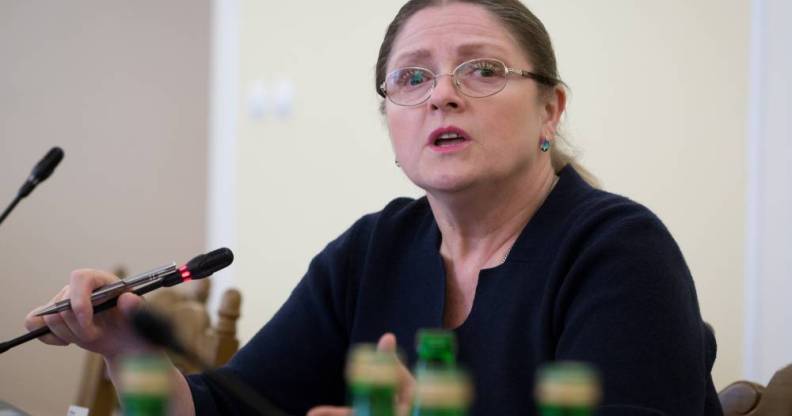Judge issues limp apology after ‘dangerously’ identifying 10-year-old trans girl on Twitter

Krystyna Pawlowicz (Polish jurist, university lecturer and political figure) at Sejm (lower house of the Polish parliament) in Warsaw, Poland on 19 March 2018 (Photo by Mateusz Wlodarczyk/NurPhoto via Getty Images)
Krystyna Pawlowicz, a top court justice in Poland, has been condemned for publicising personal information about a 10-year-old trans girl on Twitter.
On Tuesday (6 April), Pawlowicz, a justice on the Constitutional Tribunal, tweeted about the case of a school director in the town of Podkowa Lesna, near Warsaw, who had instructed teachers to respect the wishes of a trans child to be addressed as a girl.
In the original tweet, Pawlowicz disapproved of the school’s decision, arguing that it disregarded the official sex designation on the child’s records, according to Associated Press. Pawlowicz called her a “boy” and mentioned the girl’s chosen name, the name of the school, the principal’s name and the school’s address.
Krystyna Pawlowicz, who is a former politician from the ruling nationalist Law and Justice (PiS) party, later said she had deleted it “for the sake of the child”. She wrote: “The case is much more complicated than I was informed. I didn’t want to cause any distress to the child. I’m sorry.”
Sprawa jest o wiele bardziej skomplikowana niż mnie o tym poinformowano. Nie chciałam sprawić przykrości dziecku.
Przepraszam Cię.
— Krystyna Pawłowicz (@KrystPawlowicz) April 8, 2021
However, the original tweet caused a social media outcry with users pointing out the information could be used to identify the child and put her in danger.
Reuters reported Cezary Tomczyk, leader of the centre-right Civic Platform party’s parliamentary group, accused Pawlowicz of putting the child “in danger”. Tomczyk said the party was submitting a request for prosecutors to investigate Pawlowicz’s actions.
Marzena Okła-Drewnowicz, a member of the Sejm of the Republic of Poland, wrote on Twitter that she and Tomczyk had submitted a notification for the public prosecutor’s office about a possible crime being committed by Pawlowicz after she disclosed the child’s personal information.
Razem z @CTomczyk składamy do Prokuratury zawiadomienie o możliwości popełnienia przestępstwa przez panią Krystynę Pawłowicz. Sprawa dotyczy oczywiście wywołania nagonki na 10-letnie dziecko i jego rodzinę.
Działalności tej pani trzeba powiedzieć wyraźne STOP. pic.twitter.com/xRsb5JUWBa— Marzena Okła-Drewnowicz (@OklaDrewnowicz) April 8, 2021
Małgorzata Tracz, co-leader of the Polish Greens political party and a member of the Sejm since 2019, condemned Krystyna Pawlowicz on Twitter. Tracz wrote: “Teasing a 10-year-old child goes beyond all limits.”
She added that people need “more empathy for other people, not hatred”.
Szczucie na 10-letnie dziecko jest przekroczeniem wszelkich granic. W polityce i sferze publicznej potrzeba nam zdecydowanie więcej ludzi jak burmistrz Podkowy Leśnej, niż ludzi jak Krystyna Pawłowicz. Potrzeba nam więcej empatii dla drugiego człowieka, a nie nienawiści.— Małgorzata Tracz (@GoTracz) April 7, 2021
Artur Tusinski, the mayor of the town where the child attends school, called Pawlowicz’s original tweet “disgusting”. He said the tweet aimed at the welfare of the school and the principal. Tusisnki added: “We do not agree to the cynical use of children in political games.”
Tusisnki said there had also been an “enormous” outpouring of support for the child and that the school is “open to the needs of every student, including transgender students”.
LGBT+ rights in Poland has been a key human rights issue for years. Since March 2019, more than 100 regions, counties and municipalities in Poland have declared themselves to be free from LGBT+ “ideology”.
This anti-LGBT+ ideology is sadly also present amount Poland’s political leaders. President Andrzej Duda hinged his re-election campaign on his harsh opposition to LGBT+ rights. Duda also compared “LGBT+ ideology” to Soviet Union-era community indoctrination only days after vowing to ban same-sex marriage, gay adoption and LGBT+ education in schools.
In March, Poland progressed a bill that would ban abortion and same-sex marriage in the country. The legislation argued that “the concept of marriage remains reserved exclusively for the relationship of a woman and a man”. It also has terrifying implications for the rights and recognition of trans and intersex people in Poland, stating: “The term ‘sex’ should be understood as a set of biological features, including genetic features, enabling the objective distinction between a woman and a man.”

